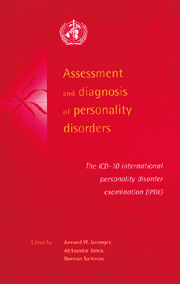 Assessment and Diagnosis of Personality Disorders
Assessment and Diagnosis of Personality Disorders Book contents
- Frontmatter
- Contents
- Contributors
- Preface
- Acknowledgements
- I Background and Field Trial
- Background
- Problems in the field of personality disorders
- Review of diagnostic instruments for the assessment of personality disorders
- Epidemiology of DSM-III personality disorders in the community and in clinical populations
- International personality disorder examination (IPDE)
- Experiences with the IPDE
- Field Trial
- II International personality disorder examination (IPDE) ICD-10 module
- Index
International personality disorder examination (IPDE)
from Background
Published online by Cambridge University Press: 04 August 2010
- Frontmatter
- Contents
- Contributors
- Preface
- Acknowledgements
- I Background and Field Trial
- Background
- Problems in the field of personality disorders
- Review of diagnostic instruments for the assessment of personality disorders
- Epidemiology of DSM-III personality disorders in the community and in clinical populations
- International personality disorder examination (IPDE)
- Experiences with the IPDE
- Field Trial
- II International personality disorder examination (IPDE) ICD-10 module
- Index
Summary
Background and History
One of the aims of the World Health Organization (WHO) and US Alcohol, Drug Abuse and Mental Health Administration (ADAMHA) joint program on psychiatric diagnosis and classification was the development and standardization of diagnostic assessment instruments for use in clinical research around the world. The International Personality Disorder Examination (IPDE) is a semistructured clinical interview originally designed to assess the personality disorders (PDs) in the ICD-10 and DSM-III-R classification systems, and subsequently modified for compatibility with DSM-IV.
The IPDE is an outgrowth and adaptation for international use of the Personality Disorder Examination (PDE) (Loranger, 1988). To facilitate the development of the IPDE, beginning in 1985 several international workshops were convened. At these meetings WHO and ADAMHA officials, together with representatives of the international psychiatric community, discussed the format of the interview, the wording of items, and the development of a scoring manual. Frequent revisions were made to reflect the experience of interviewers with trial versions. Investigators at the various centres involved in the field trial described in this volume translated the instrument into the following languages: Dutch, French, German, Hindi, Japanese, Kannada, Norwegian, Swahili, and Tamil. The translations were back-translated into English by a psychiatrist or psychologist who had not seen the original English version. Variations and problems in the back-translation were then reviewed with those who undertook the original translation, and corrections were made when indicated.
- Type
- Chapter
- Information
- Assessment and Diagnosis of Personality DisordersThe ICD-10 International Personality Disorder Examination (IPDE), pp. 43 - 51Publisher: Cambridge University PressPrint publication year: 1997
- 17
- Cited by


